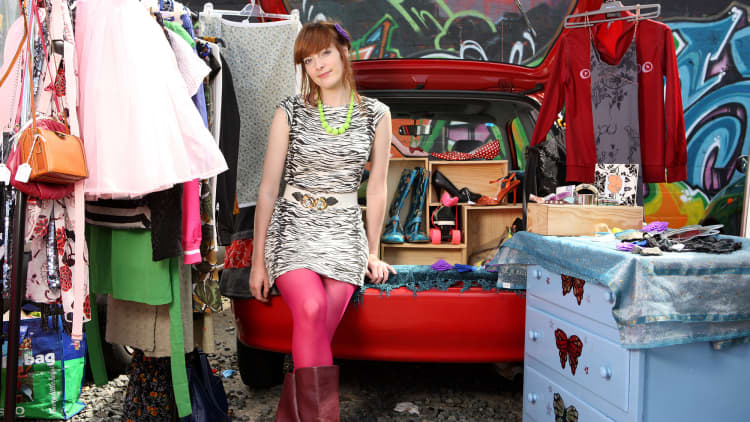
Spring is here at last, making now the perfect time to clean out the clutter in your home.
The bad news: It's difficult enough to go through and choose what to lose, and then you have to figure out what to do with it. The good news: One man's trash is another man's treasure.
"You could be sitting on hundreds of dollars worth of goods," said Andrea Woroch, a consumer advisor and contributor to the money-saving website Kinoli.
So before you purge and toss unwanted goods, consider turning that clutter into cash.
Here's how:
Most millennials are well-versed in the ways of hawking stuff on Craigslist, which is a good option, particularly for larger items that would be difficult to ship. "You'll often make more money selling via Craigslist than through a garage sale, since those bargain hunters are always trying to undercut your list price," said Woroch.
Another familiar choice is eBay. Keep in mind that a good picture is worth a thousand words. Use only language and phrases that pertain to your item, including the manufacturer, item type, size and color, to help bidders find you in a search. Finally, list your auctions during the prime times of 9 p.m. to 11 p.m. Eastern Time to maximize bids and higher sales prices.
When it comes to pricing your items, check what similar goods are selling for on Amazon, Craigslist or eBay. Assess the condition of the item you want to sell, compare it to what you've seen and set your price competitively, rather than shooting for close to retail.
For those who can't be bothered, there are also a slew of online marketplaces that make it easier, or will even sell it all for you, from second-hand clothing to previous generation iPhones and even that old engagement ring.
For example, ThredUp.com takes away a lot of the leg work by sending a "Clean Bag Out" to put your good-condition clothes in and ship back to them for free. The company will then process, price and sell your items. Whatever they don't accept, or doesn't sell, can be donated or returned for a fee. Other sites like RecycleYourFashions.com or the Poshmark app work in a similar fashion, so to speak.
Or skip the listings altogether. Sites like Gazelle.com let you trade in old electronics like phones, iPods or laptops. A 64GB iPhone 6S currently fetches about $320 on the site, although older phones are worth much less — the iPhone 5 goes for about $85 (a far cry from the $649 retail price). Alternatively, Target and Amazon also have trade-in programs, where the 6S, for example, can be swapped for a $332 gift card.
For those bulky furniture items, try using a site like Chairish or Furnishly. Post a picture with a description, and Chairish will list it for free (in return for 20 percent of the price once an item has sold). The best part is that the company will also coordinate white-glove shipping and the buyer is responsible for picking up the tab.
Jilted lovers take note: If you have recently broken up with a boyfriend or girlfriend or ended an engagement, sites like Exboyfriendjewelry.com will help you unload unwanted jewelry gifts, from Tiffany lockets to diamond engagement rings. Users must register and pay $4.99 to post an ad, which includes the breakup story — consider it lucrative and cathartic.
Of course, cleaning out years of emotional and physical clutter takes work, but having a more organized life makes you "much more productive so that you can act out your goals," said Regina Lark, a professional organizer and board member of the National Association of Professional Organizers. It will also make you some extra money.
To that end, use some of the earnings to "establish an emergency savings fund if you haven't already," said Raymond Pacheco, a credit counselor for National Foundation for Credit Counseling, who suggests keeping six-to-nine months' worth of living expenses. At that point, your budget, and your closet, will be in much better shape.
— By CNBC's Landon Dowdy


